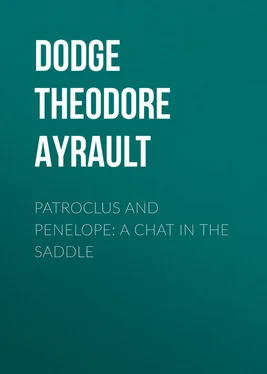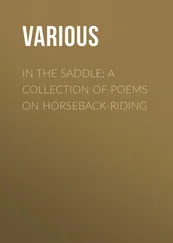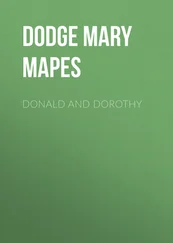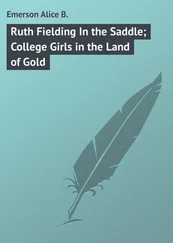Theodore Dodge - Patroclus and Penelope - A Chat in the Saddle
Здесь есть возможность читать онлайн «Theodore Dodge - Patroclus and Penelope - A Chat in the Saddle» — ознакомительный отрывок электронной книги совершенно бесплатно, а после прочтения отрывка купить полную версию. В некоторых случаях можно слушать аудио, скачать через торрент в формате fb2 и присутствует краткое содержание. Жанр: foreign_antique, foreign_prose, на английском языке. Описание произведения, (предисловие) а так же отзывы посетителей доступны на портале библиотеки ЛибКат.
- Название:Patroclus and Penelope: A Chat in the Saddle
- Автор:
- Жанр:
- Год:неизвестен
- ISBN:нет данных
- Рейтинг книги:3 / 5. Голосов: 1
-
Избранное:Добавить в избранное
- Отзывы:
-
Ваша оценка:
- 60
- 1
- 2
- 3
- 4
- 5
Patroclus and Penelope: A Chat in the Saddle: краткое содержание, описание и аннотация
Предлагаем к чтению аннотацию, описание, краткое содержание или предисловие (зависит от того, что написал сам автор книги «Patroclus and Penelope: A Chat in the Saddle»). Если вы не нашли необходимую информацию о книге — напишите в комментариях, мы постараемся отыскать её.
Patroclus and Penelope: A Chat in the Saddle — читать онлайн ознакомительный отрывок
Ниже представлен текст книги, разбитый по страницам. Система сохранения места последней прочитанной страницы, позволяет с удобством читать онлайн бесплатно книгу «Patroclus and Penelope: A Chat in the Saddle», без необходимости каждый раз заново искать на чём Вы остановились. Поставьте закладку, и сможете в любой момент перейти на страницу, на которой закончили чтение.
Интервал:
Закладка:
It is in this that the English err. In their perfect development of the hunter and the racer they neglect the training of the hack. Though it be heresy to the mania of the day to say so, it is none the less true that while you seek your bold as well as discreet and experienced cross-country rider in England, you must go to the Continent, or among the British cavalry, to find your accomplished horseman.
It is the general impression among men who ride to hounds, and still more among men who pretend to do so, that leaping is the ultima thule of equestrianism; and that a man who can sit a horse over a four-foot hurdle has graduated in the art of horsemanship. The corollary to this error is also an article of faith among men who hunt, that is, that no other class of riders can leap their horses boldly and well. But both ideas are as strange as they are mistaken.
The cavalry of Prussia, Austria, and Italy show the finest of horsemanship. More than a quarter century ago, the author spent three years in Berlin under the tuition of a retired major-general of the Prussian army, and saw a great deal of the daily inside life, as well as the exceptional parade life, of the army. He has often seen a column of cavalry, with sabres drawn, ride across water which would bring half the Myopia Hunt to a stand-still on an ordinary run after hounds. Why should not men whose business it is to ride, do so well?
Think you there was not good horsemanship at Vionville, when von Bredow (one of the author's old school friends, by the way) with his six squadrons, to enable Bruddenbrock to hold his position till the reinforcements of the Tenth Corps could reach him, rode into the centre of the Sixth French Corps d'Armée? In slender line, he and his men, three squadrons of the Seventh Cuirassiers, and three of the Sixteenth Uhlans, charged over the French artillery in the first line, the French infantry in line of battle, and reached the mitrailleuses and reserves in the rear, where they sabred the gunners at their guns. What though but thirteen officers and one hundred and fifty men out of near a thousand returned from that gallant ride? Though no Tennyson has sung their glorious deed, though we forget the willing courage with which they faced a certain sacrifice for the sake of duty to the Fatherland, think you those men rode not well, as a mere act of horsemanship?
Think you that the handful of men of the Eighth Pennsylvania, at Chancellorsville, when they charged down upon Stonewall Jackson's victorious and elated legions, riding in column through the chapparal and over the fallen timber of the Wilderness, carving their path through thousands of the best troops who ever followed gallant leader, sat not firmly in their saddles? Think you that the men who followed Sheridan in many a gallant charge, or Fitz Hugh Lee, forsooth, could not ride as well as the best of us across a bit of turf, with a modest wall now and then to lend its zest to the pleasure? Neither we nor our British cousins can monopolize all the virtue of the world, even in the art equestrian.
As there is no doubt that fox-hunting is one of the most inspiriting and manly of occupations, or that the English are preëminent in their knowledge of the art, so there is likewise no doubt that equally stout riders sit in foreign saddles. And though each would have to learn the other's trade, I fancy you could sooner teach a score or a hundred average cavalry officers of any nation to ride well across country, than an equal number of clever, fox-hunting Englishmen to do the mere saddle work of any well-drilled troops. Leaping is uniformly practiced and well-taught, in all regular cavalry regiments of every army with which I have been familiar in all parts of the world.
XI
Well, Patroclus, you have earned your gallop. I loosen in the least my hold upon the reins, and shaking your head from very delight, off you go like the wind. Never could charger plunge into a mad gallop more quickly than you, Patroclus. Your stride is long, your gather quick, and the reserve power in your well-balanced movements so inspiring, that I would almost ride you at the Charles River, in the expectation that you would clear it. But the lane is all too short. Steady, sir, steady! and down you come in a dozen bounds to a gait from which you can fall into a walk at word.
But what is that? A rustling in the woods beside us! That sounds indeed frightsome enough to make you start and falter. You are not devoid of fear, Patroclus. No high-couraged horse can ever be. But though you may tremble in every limb, if I speak to you, I may safely throw the reins upon your neck. So, boy! To face danger oftener insures safety than to run from it. To the right about, and let us see what it means. Steady, again! Now stand, and let it come. There, Patroclus, despite your snort of fear, it is only a couple of stray calves cutting their ungainly capers as they make their way towards home. Their bustle, like that of so many of the rest of us, far exceeds their importance. Was not this much better seen than avoided? You would have hardly liked this pleasant lane again had we not seen the matter through.
I have never kept you in condition, Patroclus, to stand heavy bursts after hounds, or indeed any exceptionally long or sharp run. That means too much deprivation of your daily company. Nor indeed, be it confessed, is your master himself often in the condition requisite to do the sharpest work. It will generally be noticed that the clear eye and firm muscle of the rider is a factor in the problem of how to be in at the death, as well as the lungs and courage of the hunter. And yet, Patroclus, you are, within your limits, a model jumper, and always seem to have a spare leg. No horse delights more in being headed at a wall or ditch than you, even in cold blood. For any horse worthy the name will jump after a fashion in company. At the end of our lane we can take the short cut towards the great highway, over the gate and the little brook and hedge. As I talk to you, I can see that you catch my purpose, for as we draw near the place, the might of conscious strength seems to course through all your veins. Perhaps I have unwittingly settled into my seat as I thought of the four-foot gate. Here we are, and there is just enough bend in the road to ride at the gate with comfort. Head up, ears erect, eyes starting from out their sockets, no need to guide you towards it, my Patroclus! No excitement, no uncertainty, no flurry. You and I know how surely we are going over. A quiet canter, but full of elastic power, to within about fifty feet of the jump, and then a short burst, measuring every stride, till with a "Now boy!" as you approach the proper gather, I give you your head, and you go into the air like a swallow. Just a fraction of a second – how much longer it seems! – and we land cleverly, well together, and in three strides more you have fallen into a jog again. And now you look back, lest, perchance, the lump of sugar or Seckel pear which used to reward you when you were learning your lesson should be forthcoming now. But no, Patroclus, my good word and a kindly pat for your docility and strength must be your meed to-day. Canter along on the soft turf till we come to the little brook. We will call it a brook, and think of it as a big one, though it is barely eight feet wide. But never mind. We can jump thrice its width just as well as across it. Remember, Patroclus, water requires speed and well-set purpose, as height does clean discretion. At it, my boy! Take your own stride. There's lots of room this side and more on the other bank.
"Harden your heart, and catch hold of the bridle,
Steady him! Rouse him! Over he goes!"
In the air again; this time it seems like a minute almost. There, Patroclus, if it had been twenty feet of water, you would not have known the odds. Now for the road and company.
Читать дальшеИнтервал:
Закладка:
Похожие книги на «Patroclus and Penelope: A Chat in the Saddle»
Представляем Вашему вниманию похожие книги на «Patroclus and Penelope: A Chat in the Saddle» списком для выбора. Мы отобрали схожую по названию и смыслу литературу в надежде предоставить читателям больше вариантов отыскать новые, интересные, ещё непрочитанные произведения.
Обсуждение, отзывы о книге «Patroclus and Penelope: A Chat in the Saddle» и просто собственные мнения читателей. Оставьте ваши комментарии, напишите, что Вы думаете о произведении, его смысле или главных героях. Укажите что конкретно понравилось, а что нет, и почему Вы так считаете.












